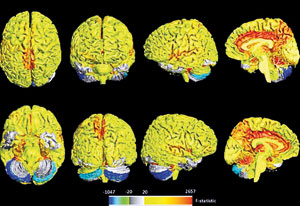Women really overthink things:Study claims
It’s a popular stereotype: women overthink things more than men. Now the biggest brain imaging survey ever conducted has found evidence to support that theory. Analyzing data from more than 45,000 studies, researchers at Amen Clinics in California concluded that women’s brains are significantly more active than men’s.

Pictured are brains scans that show activity in men’s and women’s brains. Significantly increased activity in men’s brains is shown in blue, while significant activity in women’s brains is shown in red
Blood flow was much higher in many parts of women’s brains as compared to men’s, increasing their ability to focus and empathize but also their vulnerability to feel anxious. While the finding may settle a few couple’s arguments, scientists say it also offers crucial insight into why certain brain disorders are more common in women – such as Alzheimer’s – and others in men – such as ADHD. Women have significantly higher rates of Alzheimer’s disease, depression and anxiety disorders.
Men, meanwhile, are more likely to have ADHD and conduct-related problems, and are more likely to be incarcerated.
Women’s brains were found to be significantly more active than those of men, particularly in two regions – the prefrontal cortex, associated with focus and impulse control, and the limbic system, which is associated with mood and anxiety.
There were some parts of the brain that were more active in men, specifically the visual and coordination centres of the brain. These findings might explain why women tend to exhibit greater strengths in the areas of empathy, intuition, collaboration, self-control and appropriate concern.
They could also account for increased vulnerability in women to anxiety, depression, insomnia and eating disorders.
Researchers looked at single photon emission computed tomography (SPECT) imaging studies provided by nine clinics. SPECT can measure blood flow in the brain.
‘This is a very important study to help understand gender-based brain differences,’ said lead author and founder of Amen Clinics Inc Dr Daniel G Amen.
Women need 20 minutes more sleep than men
Several studies have found that women need to sleep longer than men — around 20 minutes a night for an average of seven or eight hours sleep to feel properly rejuvenated.
The latest, a 2016 study by scientists at the Max Planck Institute in Germany, compared 160 adults of both sexes and found that women need to sleep longer to restore brain power.
But it’s not because of any fundamental neurological differences between the sexes, say experts.It’s instead that juggling different tasks throughout the day is more taxing on the brain than sticking to one, and this, they suggest, typically reflects a woman’s daily responsibilities.
‘You could spend a whole day at the computer on a really tough assignment and, although it would be tiring, it would only be using one part of the brain,’ says Professor Jim Horne, former head of Loughborough University’s sleep research centre.


